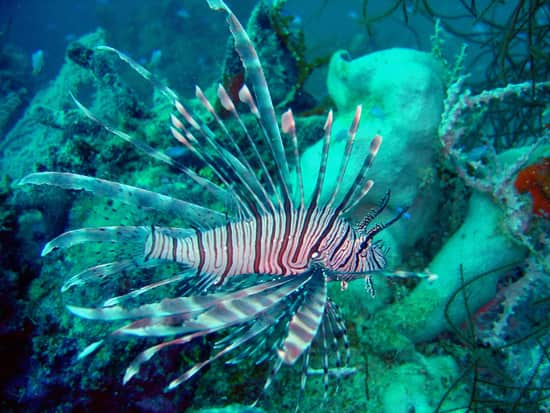Florida, We Have a Lionfish Problem

By Alan Peirce
Let’s talk straight. Lionfish are a challenge. Native to the Indian Ocean and South Pacific, these beautiful yet venomous creatures are spreading through our waters like a bad cold. Within their native range, lionfish fit nicely into the natural food web and their populations remain in check. But not in Florida. Our native predatory fish are simply not ordering the new and bizarre-looking menu item, leaving little to control the lionfish population.
Initial sightings of lionfish in Florida waters began in the mid-1980s. The rarity of sightings initially made it difficult for biologists to assess the significance of the problem. As we were gathering data, the species spread slowly, but methodically, infiltrating the Caribbean and waters off the Atlantic Coast and Bermuda. By the 2000s, the story became much clearer, as many countries within the invaded range witnessed dramatic lionfish population increases and were forced to initiate control programs.
All hope that Florida might somehow be spared was eliminated during the past few years as we began to witness a population explosion of our own along the southeast coast, including the Florida Keys. Today, we are seeing them in places we’ve never seen them before, including the northern areas of the Gulf of Mexico, as their numbers are increasing rapidly.
So what’s the big deal about having another beautiful species of tropical fish in our waters? Well, ultimately it’s the economy! Florida’s economy and the health of our marine ecosystems are directly linked. Marine ecologists are concerned that lionfish will significantly alter the population dynamics of our native marine species, resulting in damage to Florida’s reef systems. Lionfish could also negatively affect our recreational and commercial fisheries through direct competition for food and habitat. Anything that hurts fishing and diving will also hurt hotels, restaurants, retail stores and the entire economy of the state.
Now I don’t want to sound like an alarmist, but this is a serious situation that needs our full attention. This is especially true for those who scuba dive and snorkel in Florida. As it turns out, harvesting by spear or dip net is currently our best means of controlling the species and minimizing the negative consequences. Pole spears with multipronged “paralyzer” tips have proved to be the safest and most effective tool for harvest. Puncture-resistant harvest bags and buckets with a rigid funnel entrance can also be used to safely transfer the fish from the spear to the container while avoiding contact with their venomous barbs.
So what is the Florida Fish and Wildlife Conservation Commission (FWC) doing to address the problem? The FWC recently eliminated the requirement to have a recreational fishing license for lionfish control when using certain types of spears and dip nets. The change, which is in effect through August 2013, also eliminated the default recreational bag limit. With these changes, which are designed to encourage lionfish-control efforts, the only thing that limits your lionfish hunting is your ability to shoot and the size of your cooler.
The FWC will continue to provide information on lionfish control through MyFWC.com, social media sites, publications, presentations, etc. You will also see lionfish information cards in dive shops around the state that are designed to educate divers and encourage lionfish-control efforts. The FWC is also developing incentive programs to encourage lionfish removal. Unfortunately, the elimination of lionfish is not likely, given the scope of the problem, but localized populations can be controlled through active removal efforts.
It’s not all doom and gloom! Researchers have determined through tagging studies that lionfish exhibit high site fidelity, which is a fancy term that means once they find a good place to hang out, they generally never leave. Lionfish are also slow and easy to see, which makes them very easy to shoot. I also hear they are on par with hogfish or snapper after being dipped in hot grease for a few minutes. Lionfish derbies hosted by the Reef Environmental Education Foundation (REEF), artificial reef organizations and dive clubs in recent years have proved to be a big success and a ton of fun for those who are participating.
If you are a diver, I strongly encourage you to take up the fight. Please understand that lionfish have spines that are venomous and can cause painful wounds if you are not careful when handling the fish. For additional information on lionfish harvesting, handling, informational workshops, derbies and reporting, please visit MyFWC.com/Nonnatives and click on “Marine Life.” You can also find great information at REEF.org/lionfish.
Send us photos and videos of your next adventure, and we’ll be happy to post them on our website with your permission. Report lionfish catches to the U.S. Geological Survey at 877-STOPANS (877-786-7267). Record all your other catches at snookfoundation.org or by using the iAngler phone app.

